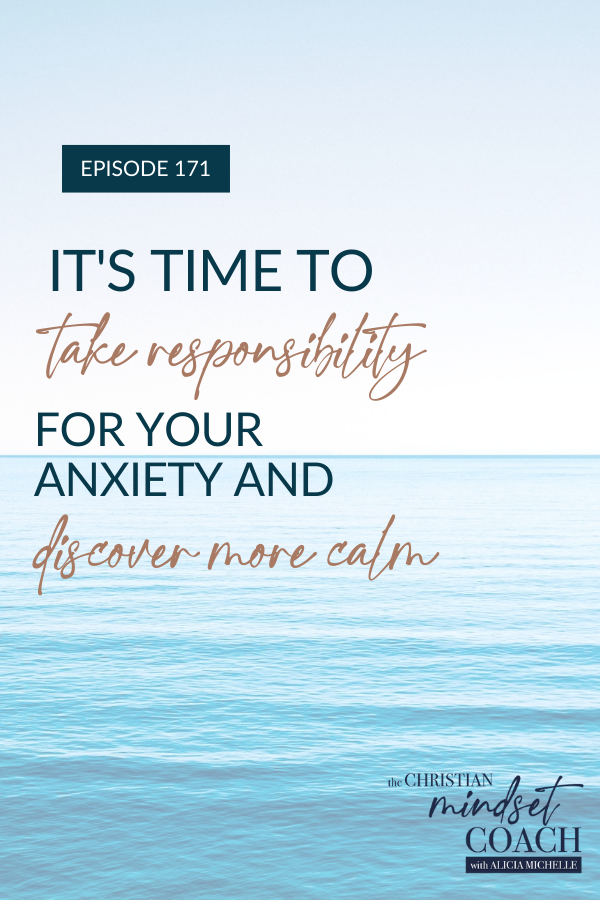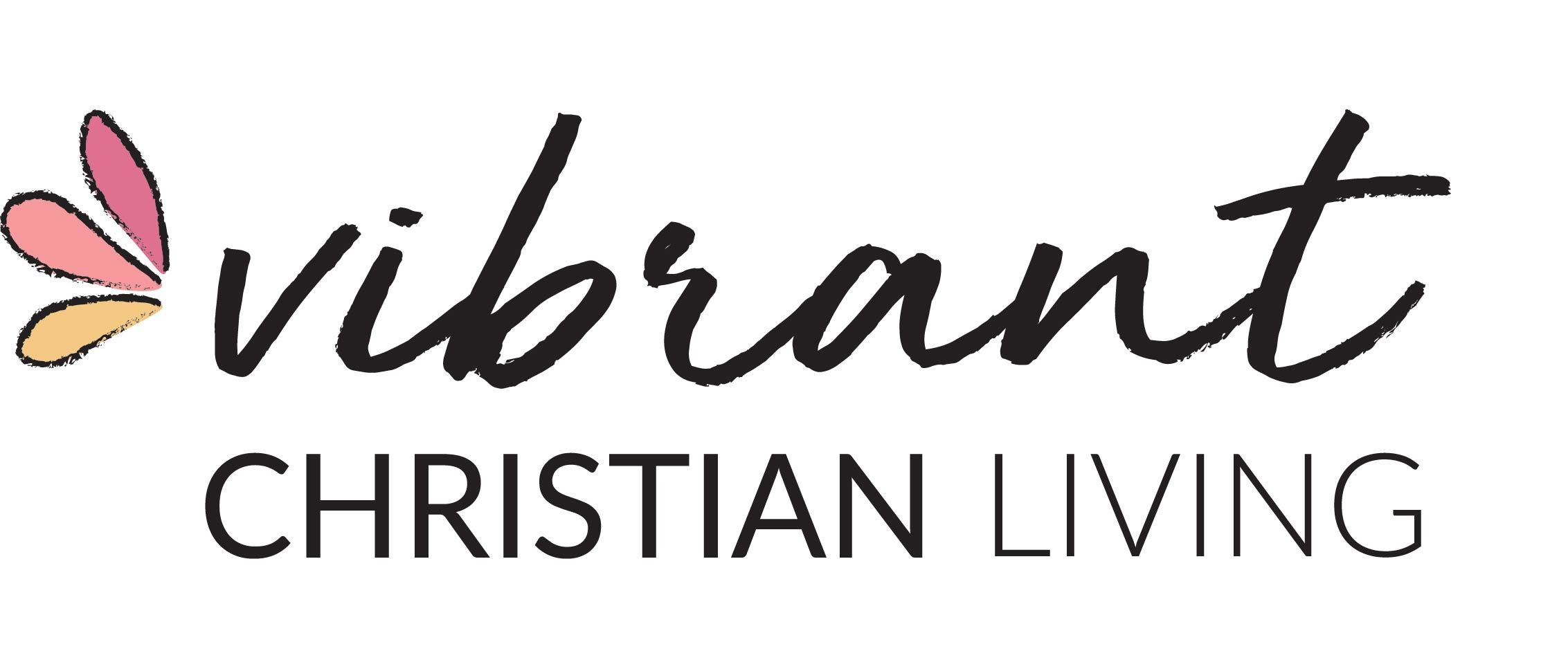Do you feel defeated when your stressful and anxious thoughts surface? We want to stop our anxiety in the moment and find a “quick-fix” strategy to help stop us from feeling the pain, but that doesn’t address the underlying mindset issues we’re facing.
Let’s talk about how to manage anxiety, take responsibility for the anxiety that isn’t going to go away, and discover how to respond differently and find more calm. In this episode, we will be looking at the anxiety triggers we face, how to stop feeling frustrated when our issues come up, and the plan we can put into place using the Calm Your Anxiety Tool Kit to feel more replenished in our lives.

WHAT YOU’LL LEARN:
- [4:47] Tough Love on Taking Responsibility for How We Respond to Anxiety
- [9:43] Where Does Your Anxiety Come From?
- [15:04] Addressing Our Anxiety By Identifying Fears and Unmet Needs
- [15:45] A need for comfort
- [18:12] A need for release
- [20:38] A need for control
- [22:38] Establishing a Firm Mental Foundation to Respond Differently to Anxiety
- [27:04] 4 Promises of God to Stand On When Anxious Thoughts Arise
- [29:38] Proactive Ways to Welcome Calm and Stand Strong Against Anxiety Triggers
- [30:35] The Surprisingly Powerful Anxiety Coping Skill (That Isn’t Talked About)
[4:47] Tough Love on Taking Responsibility for How We Respond to Anxiety
If you haven’t listened to Episode 170 yet, I encourage you to do so along with the other episodes in this anxiety series. Episode 170 specifically looks at this myth that we as Christians shouldn’t have fear in our lives.
I often hear Christian women say, “If I'm a Christian, then I shouldn't struggle with stress or anxiety. I should give this all to God”, but the thing is, God never says we won’t have these struggles. However, he does want us to let Him help us learn new ways to manage anxiety triggers and life challenges.
We have an invitation from God to respond differently to these mindset triggers. You can learn new strategies to respond, and I help you do that in the Calm Your Anxiety Took Kit, your step-by-step to effectively manage anxiety, worry and fear using proven brain science and life-giving biblical truth.
Many of us struggle with guilt as part of our anxiety, and today I want to help you be released from this guilt.
I also have some tough love in today’s episode on anxiety: You and I must take responsibility for managing our own anxiety and our own happiness. God can lead us to anxiety resources and tools to help, but no one else can do this work for us. As Christian women we must be obedient to listen to the Bible verses on worry and decide that we will respond to anxiety.
In Episode 170, we talked about how to release the guilt around anxiety, specifically how to see God’s conviction as a healthy encouragement (a “check engine light”) so that his helpful correction leads us to take action. We must take control of our mindset issues by addressing them and begin experimenting with ways to minimize our anxiety. Sometimes we get stuck in the fear and become overwhelmed on what step to take next, but God will always be with us in the process.
Instead of blaming those around us and the circumstances around us, it is time for us to take responsibility for our unhappiness, guilt, and anxiety. There is no doubt that it is a grieving process we go through in all of the difficulties, but God wants us to lean on Him during these times and while we take responsibility for our actions.
[9:43] Where Does Your Anxiety Come From?
First, we can’t just ‘snap out’ of our feelings. That’s a very ineffective strategy that many of us use, and God doesn’t relate to us in that way. He is a loving God and honors these fearful emotions as valid, so it’s good that we can recognize them as well and bring them to the light in a non-judgemental way.
In order to begin healing from anxious behavior we must get to the root cause of the anxiety. What is causing our anxious thoughts? Again, in episode 170, God tells us that there will be a reason for fear and anxiety in this world.
There are two resources I want to give you to help you discover the root of the mindset issues around anxiety.
The first resource is the Christian Mindset Makeover. If you aren’t quite sure how to pinpoint the root of the problem, this course is a great way to do that. By helping you lovingly identify and release subconscious thoughts that have caused your conditioning, I will lead you through a specific brain science process called brain priming to create a brand new subconscious thought pattern that will allow you to respond differently to anxiety triggers. This is a very comprehensive and powerful resource for creating a different response to anxiety.
The second resource is Faithful Counseling. If you feel that your anxiety is rooted in a past or present trauma (and you have not processed it), then I recommend starting here and then moving to the Christian Mindset Makeover. Faithful Counseling matches you with a certified Christian counselor you’re compatible with, and their services are completely online, which means that you can live anywhere in the world and get connected with a great Christian counselor. In full disclosure, I have an affiliate relationship with Faithful Counseling so I do receive a small commission should you decide to work with them.
[15:04] Addressing Our Anxiety By Identifying Fears and Unmet Needs
Another way we can take responsibility for our anxiety and find the calm we are looking for is by taking a closer look at the anxiety trigger.
What is the root fear or unmet need that’s causing us to worry and be anxious? They usually are one or a combination of the following:
[15:45] A need for comfort
Often we feel a false sense of comfort when we try to “solve” our issue through anxious thoughts. Although we can strategize some solutions to handle the situation, it’s still a false sense of comfort because it keeps us stuck in a continuous cycle of worry.
Instead we can recognize that we’re feeling a need for comfort around a stressful situation (which is normal) and seek comfort in healthier ways.
Comfort can come in many ways: physical, emotional, intellectual, and spiritual. For example, the spiritual side of comfort comes from things like journaling, reading the Bible, and praying. Physical comfort can be everything from putting on a fuzzy blanket around you, getting a hug from someone, lighting a candle, and smelling a home-cooked meal. We talk about the different things that bring you comfort inside the Calm Your Anxiety Tool Kit and experiment to see which ones work best for you.
Comfort is a really interesting part of understanding how to manage anxiety. It is learning how to turn towards the right kinds of comfort instead of falling back on anxiety and worry as an old way to comfort yourself.
[18:12] A need for release
Sometimes when we have so much stress in our lives we simply need to release it instead of holding on to it. When we hold on to the stress we can tend toward anxious thoughts. God gives us the ability to utilize different forms of surrender. Most of us may think about spiritual surrender, but physical release is a huge way to move our energy out of our bodies. There are exercises inside the Calm Your Anxiety Tool Kit and the Christian Mindset Makeover that help us release that energy.
We often hold in that trigger to control and manage it, but God is telling us to let it go! So what do you need to do in the moment to release this responsibility?
[20:38] A need for control
The third need to be met is the need for control. We have referenced it a few times in this episode, but Episode 164 asks us two questions in surrendering to God for more peace in recognizing what we can and can’t control. First, what do you need to let go of and confess? How are you going to release it out of your mind? This episode is great in helping you take responsibility in terms of what you can control so that you can respond differently to anxiety triggers.
[22:38] Establishing a Firm Mental Foundation to Respond Differently to Anxiety
What will be a Christ-centered truth (about God Himself, about His promises for you, or about your identity in Christ) that you’ll stand on as a foundational truth to help you not choose anxious thoughts? When you’ve created that firm spiritual foundation, it’s much easier to manage anxious thoughts and rest in God’s strength and an attitude of praise.
What if God is inviting you deeper and further into a relationship with Him through this back and forth season? What if this is how He wants to strengthen your faith and create a firm foundation of trusting in Him? It can be challenging, of course, but the Psalms give great examples of how we can balance our up and down emotions and fears while still choosing to focus on God’s promises.
[27:04] 4 Promises of God to Stand On When Anxious Thoughts Arise
These promises are just some I have come up with that are meaningful to me from scripture. I encourage you to ask yourself, “What promises of God will help me have a confident, firm response in the face of anxiety triggers? What will bring comfort, release and let me release control and instead trust God?”
Here are a few Bible verses that bring me comfort when anxiety strikes (feel free to use these or come up with your own):
Another excellent anxiety exercise is to write your own psalm where you fill in the blank with how you feel and then choose to stand on the promises that God has given you. So what are the promises of God that you can claim and stand on as a way to take responsibility for managing anxiety in your head?
[29:38] Proactive Ways to Welcome Calm and Stand Strong Against Anxiety Triggers
I recommend that we not only manage anxiety in the moment but we also actively create regular rhythms of replenishment and stress-relieving activities. These ongoing maintenance rhythms can be so powerful; and honestly, they’re not something that is talked about a lot in the world of anxiety. Instead, people want the “quick fix” in order to feel better. It’s like the diet culture where people want to lose weight in a certain amount of time instead of learning to maintain a healthy weight and lifestyle.
This is critical for our long-term success in finding regular rhythms of replenishment and stress-relieving activities.
[30:35] The Surprisingly Powerful Anxiety Coping Skill (That Isn’t Talked About)
If you want to create more of these regular rhythms to keep us strong and rested in the face of anxiety triggers, ask yourself this great question: “What is fun to me?”
In a recent session with a client, we talked about being busy all day long with being a caretaker and working two jobs. There is this heavy load she is carrying all by herself. From there, we began to talk about ways of replenishing herself after all of the stress. How did she find ways to fill herself in the past and have fun? She mentioned driving down a road to see where it ends.
We can do things to bring joy back into our lives by scheduling them in, being spontaneous, you name it. What would fun look like for you? This regular replenishment of fun activities, no matter what it looks like for you, is an essential part of managing anxiety.
However, we also have to admit that sometimes we struggle with the idea of letting ourselves have some fun. There can be emotional baggage keeping us from finding the stress relief we need.
For example, we must stop saying that “only weak people need fun” because it insinuates that something is wrong with us if we need that to keep going. If that is something that you struggle with, then you are in good company.
Sometimes we tend to squelch our own fun. We think, “I should be able to handle things and keep going.”
We also tell ourselves that we don’t have time or money for fun. We have told ourselves that fun must be extravagant, but fun can be simple. It doesn’t always have to be grandiose plan that involves a lot of time or money.
It's better to have a regular rhythm of small tiny pleasures than to have a big idea that never happens. If we don’t start adding small pleasures now, we will naturally adjust to our anxious behavior.
Here’s the great news: We don't need anyone's permission to make our everyday tasks more fun. You have permission to experiment with what fills you up with joy! I encourage you to experiment with fun things because usually, this is a time of being worn out. It’s time to create healthy behaviors around the idea of fun!
Speaking of fun, next week’s episode will be about something big and fun I am doing this summer. This is in my attempt to continue taking care of myself, manage my responses to ongoing stress, and walk the talk in what I'm talking to you guys about weekly.
OTHER PODCAST EPISODES ON RELEASING GUILT:
- 170: How to Release Guilt Around Worry and Anxiety
- 169: 4 Bible Verses on Anxiety When You Need Calm + Peace
- 167: How to Connect with God When You’re Struggling with Shame, Guilt + Feeling Not Enough
- 165: How to Pray Confidently and Consistently for More Connection with God with Valerie Woerner
- 163: How I Take Courage, Manage Anxiety and Release Fear with Amy Debrucque
Free Anxiety Workshop (for Calm Your Anxiety Mindset Tool Kit):
SIGN UP FOR THE FREE WORKSHOP:
3 Steps to Freedom from Anxiety Based on Brain Science + the Bible
Do you struggle with worry and anxiety? You’re not alone—Anxiety is arguably the #1 mental health issue today, even for Christians.
As a former anxiety sufferer (and a NeuroCoach that’s worked with 100s of women) I’ve learned that we need practical mindset TOOLS (based on both brain science and God’s word) to get His calming TRUTH into our thoughts.
That’s why I host my FREE anxiety workshop: 3 Steps to Freedom from Anxiety Based on Brain Science + the Bible… and you’re invited to join me!

